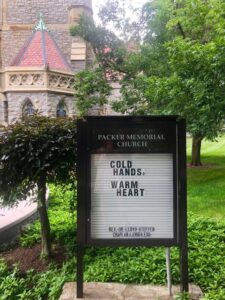Upon Lehigh’s decision for a primarily remote fall semester, various religious organizations across campus are preparing to operate safely.
Lloyd Steffen, the university chaplain and a professor of religious studies, is responsible for raising issues on campus for spiritual and ethical importance. The Chaplain’s Office, which is involved in academic and co-curricular life at Lehigh, and is responsible for worship, programming, out-of-classroom learning experiences and regular teaching.
The Chaplain’s Office is still in the process of adjusting to the new ways of life amid the coronavirus pandemic.

Lehigh’s Chaplain Office said religious programming will look differently this semester due to the coronavirus. On-campus housing will be limited mostly to first-year students. (Emma Satin/B&W Staff)
As a part of commencement in May, the Baccalaureate service was canceled and all planned weddings at Packer Memorial Church this year have been canceled.
Though he does not fault the administration, Steffen said it’s hard to know what to do when they don’t have all the information and not all decisions have been made.
“They [the administration]don’t know either,” Steffen said. “They’ve got to listen to higher ups, the governor and to wider policy decision-making in the state.”
Walead Mosaad, the director of Muslim Student Life at Lehigh, said Lehigh plans to follow the state’s lead in dealing with the coronavirus, but expects to be more cautious.
Most of the activities directed by Mosaad and the Muslim Student’s Association will be hosted online. He said Lehigh’s recent decision to limit campus housing mostly to first-year students means “it is highly unlikely there will be any on-campus activities for religious life during the fall.”
In March, Mosaad started a series of weekly Zoom sessions reflecting on traditional wisdom through reading poetry by Rumi. He said he wants to continue inviting students and faculty to these sessions.
“I think students should rest assured that there will definitely be big changes with the situation at hand, but we just have to make the best of it,” Mosaad said.
Rabbi Steven Nathan, the endowed director of Jewish Student Life and associate chaplain, is working on the assumption that a good number of students will be returning to campus or near campus, despite only first-years living in university housing.
He said he will wait and see what the university and state regulations are in terms of communal gatherings and meals, but right now, Lehigh is even encouraging one-on-one meetings to be virtual.
The Lehigh Hillel Society usually offers free Shabbat dinner to students every Friday. They also have in-person holiday celebrations, social events, cultural programs and community service opportunities.
“I’ve been in contact with a lot of colleagues in the Hillel and Jewish campus life world to see what ideas students and staff have been coming up with,” Nathan said. “We’re really going to have to rely on the internet, as we have been.”
In the spring, Chloe Goldstein, Lehigh Hillel’s engagement and programming associate, started the blog, Healing and Wholeness in an effort to stay connected and offer resources and support to students. The blog also features recipes and humorous posts, encouraging those with ideas to contribute.
Nathan said he and Goldstein are available as resources to talk with students or discuss programming ideas.
Chabad at Lehigh is planning for smaller crowds, utilizing outdoor spaces and adhering to social distancing guidelines. Since the beginning of the pandemic, Rabbi Zalman Greenberg said they have been able to continue programming through Zoom sessions.
“In addition to the virtual programming that Chabad will offer, we will host in person events such as our signature Friday night and Shabbat day services, dinner and lunch. We are also planning on hosting all of the High Holiday services and meals,” Greenberg said. “Of course, all events will adhere to state and local guidelines as well as recommendations from the CDC.”
During a typical semester, students would travel off campus to the Chabad house for Friday night Shabbat services and dinner. Greenberg believes the relationships and communication between students is strong enough to keep them participating despite less students being on campus.
The Chaplain’s Office is prepared to support students and staff throughout the unprecedented semester. The office plans to introduce themselves through a program or forum where students and faculty are invited to raise questions.
“This is a very troubling time,” Steffen said. “We are all carrying different kinds of burdens, whether it be concerns about family, the health of ourselves or the health of others. It doesn’t mean we have answers for any of these things, but we’re another place to go to to find out how to talk about these things and get clear in their own minds.”





Comment policy
Comments posted to The Brown and White website are reviewed by a moderator before being approved. Incendiary speech or harassing language, including comments targeted at individuals, may be deemed unacceptable and not published. Spam and other soliciting will also be declined.
The Brown and White also reserves the right to not publish entirely anonymous comments.